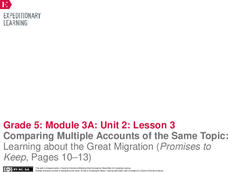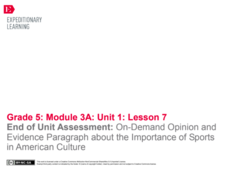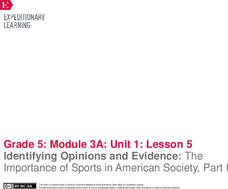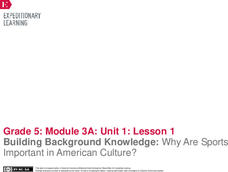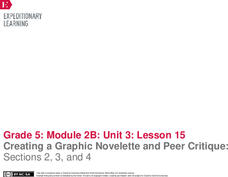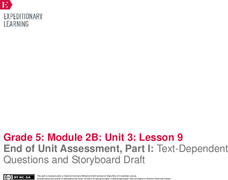EngageNY
Identifying Supporting Reasons and Evidence for an Opinion: Exploring Why Jackie Robinson Was the Right Man to Break the Color Barrier (Promises to Keep, Pages 26–29)
Breaking barriers is not an easy thing to do. Scholars read a section in Promises to Keep and summarize how Jackie Robinson broke the color barrier in baseball. They write the gist of the passage in their journals and then complete a...
EngageNY
Research: Close Read of Text 3 for Each Expert Group
How do athletes break barriers? Pupils consider the question as they continue looking for evidence to support their opinions about how their chosen athlete created a legacy. In small groups, they read an informative article about either...
EngageNY
Organizing an Opinion, Reasons, and Evidence: Text 2 for Each Expert Group
The proof is in the reading. Using the informative resource, scholars read a second article about either Althea Gibson or Roberto Clemente. As they read, they continue adding reasons and evidence to their graphic organizers to show how...
EngageNY
Research: Close Read of Text 2 for Each Expert Group
Pass the chalk! Pupils participate in a Chalk Talk activity to synthesize information from multiple texts about Roberto Clemente and Althea Gibson. Scholars also read an informational article about one of the athletes, searching for...
EngageNY
Organizing an Opinion, Reasons, and Evidence: Text 1 for Each Expert Group
Working in small groups, scholars continue reading an informational text about either Roberto Clemente or Althea Gibson. As they read, pupils create graphic organizers in their journals to help map their ideas logically.
EngageNY
Introducing New Athletes to Research: Althea Gibson and Roberto Clemente
Let's take a walk! Scholars participate in a gallery walk to view images and text about athletes Althea Gibson and Roberto Clemente. After summarizing the information they've learned, pupils choose which athlete they are interested in...
EngageNY
Explaining the Relationships between Events in a Historical Text: Contextualizing the History of Baseball (pages 8–9, 25)
In other words ... it's time to give a summary. Scholars work with a partner to paraphrase a timeline card referring to Promises to Keep. They then work to merge the two timelines to create one timeline. Pupils finish by writing a...
EngageNY
Inferring Author’s Opinions and Writing Opinion Statements: Journalists’ Opinions about Segregation Post–World War II (Promises to Keep, Pages 22–25)
Let's play ball! Scholars summarize information from Promises to Keep about segregation in professional baseball after World War II. They then listen as the teacher reads pages 22-25 aloud. Pupils write the gist in their journals of the...
EngageNY
Comparing Multiple Accounts of the Same Topic: The Story of Bus Desegregation (Promises to Keep, Page 21)
It's all connected. Learners read event details in Promises to Keep to determine the connection between the bus boycott and Jackie Robinson. They watch a video and read Rules for Riding Desegregated Buses to discover even more details to...
EngageNY
Reading to Determine Important Relationships between People and Events: The Importance of the 1936 Olympics for African Americans (Promises to Keep, Pages 16–19)
Scholars look at cause-and-effect relationships while doing a close read of the 1936 Olympics on pages 16-19 of Promises to Keep. They complete a cause-and-effect note catcher and add their ideas to an anchor chart. Readers then work...
EngageNY
Determining Author’s Opinions, Reasons, and Evidence: Signs of Hope and Progress for African Americans in the 1920s (Promises to Keep, Pages 14–15)
Caption this. Readers look at the text features in Promises to Keep and pay special attention to the photographs and captions before adding to the Features of Informational Text anchor chart. Learners then answer questions about life in...
EngageNY
Comparing Multiple Accounts of the Same Topic: Learning about the Great Migration (Promises to Keep, Pages 10–13)
Get the story straight. Scholars gather information about the Great Migration as they listen to a reading from Promises to Keep. They then examine the text to find evidence to support the feeling of resentment. Learners take part in a...
EngageNY
Synthesizing from Informational Texts: Main Idea and Key Details from Promises to Keep (Pages 8– 10)
Learners determine the main idea of a timeline on pages eight and nine of the text Promises to Keep. They use the timeline to complete a Main Idea and Details note catcher and then share their thoughts with the class. To finish,...
EngageNY
Introducing Promises to Keep and Drawing Inferences: Who Is Jackie Robinson and Why Is He Important? (Promises to Keep, Pages 6–7)
Scholars take a picture walk through the book Promises to Keep: How Jackie Robinson Changed America. They make predictions and complete a Notice/Wonder/Inference note catcher. They then define and analyze words on pages six and seven of...
EngageNY
End of Unit Assessment: On-Demand Opinion and Evidence Paragraph about the Importance of Sports in American Culture
Game on! Pupils take their end-of-unit assessment, writing an opinion paragraph about the importance of sports in American culture. To support their opinions, they use evidence from the informational articles they've read throughout the...
EngageNY
Organizing Evidence and Writing an Opinion Paragraph: The Importance of Sports in American Society, Part II
Batter up! Using the resource, pupils continue reading an informational article about sports in America and identify evidence that supports the author's opinion. Scholars then write an opinion paragraph about sports.
EngageNY
Identifying Opinions and Evidence: The Importance of Sports in American Society, Part I
What's the gist? Learners determine the gist of an informational article about sports in America. They also participate in a jigsaw activity, rereading the article and discussing the author's opinion and supporting evidence.
EngageNY
Mid-Unit Assessment: Identifying Author’s Opinion and Supporting Evidence: Sports in American Culture
Quiz time! Serving as the mid-unit assessment, scholars complete a Two Opinions Word Sort activity. In addition, they read an article about the importance of sports in America and answer text-based questions.
EngageNY
Identifying Author’s Opinion and Evidence: The Value of Sports in People’s Lives, Part II
Context matters! Using the intuitive resource, pupils decipher context clues to determine the meaning of unknown words from an informational text. Also, in small groups, they practice identifying the author's opinion and supporting...
EngageNY
Identifying Author’s Opinion and Evidence: The Value of Sports in People’s Lives, Part I
Just like instant replay, it's time to take a closer look! Pupils work together to add ideas to a Close Readers Do These Things anchor chart. They then put their knowledge to the test as they read an informational article about the...
EngageNY
Building Background Knowledge: Why Are Sports Important in American Culture?
What makes sports so special to many Americans? Scholars ponder the question as they participate in a gallery walk, immersing themselves in images and texts about sports. Pupils also complete a vocabulary strategies anchor chart to...
EngageNY
Creating a Graphic Novelette and Peer Critique: Sections 2, 3, and 4
Let's get creative! With the fun resource, pupils continue working on their graphic novelettes about an invention, adding text and images to each section. When finished, they engage in a peer critique process, giving and receiving...
EngageNY
End of Unit Assessment, Part 1: Text-Dependent Questions and Storyboard Draft: “You Can Do a Graphic Novel” Excerpt
Eyes on the finish line. Serving as the first part of the end of unit assessment, learners answer questions based on a text about how to write a graphic novel. Using what they've learned, they then create a storyboard about the invention...
EngageNY
Mid-Unit Assessment: On-Demand Note-taking and Text-Dependent Questions
Flex those brain muscles! Scholars take a mid-unit assessment, conducting research to take notes about how a particular invention helped meet society's needs. To complete the test, they work on draft sketches for their graphic novelettes.













